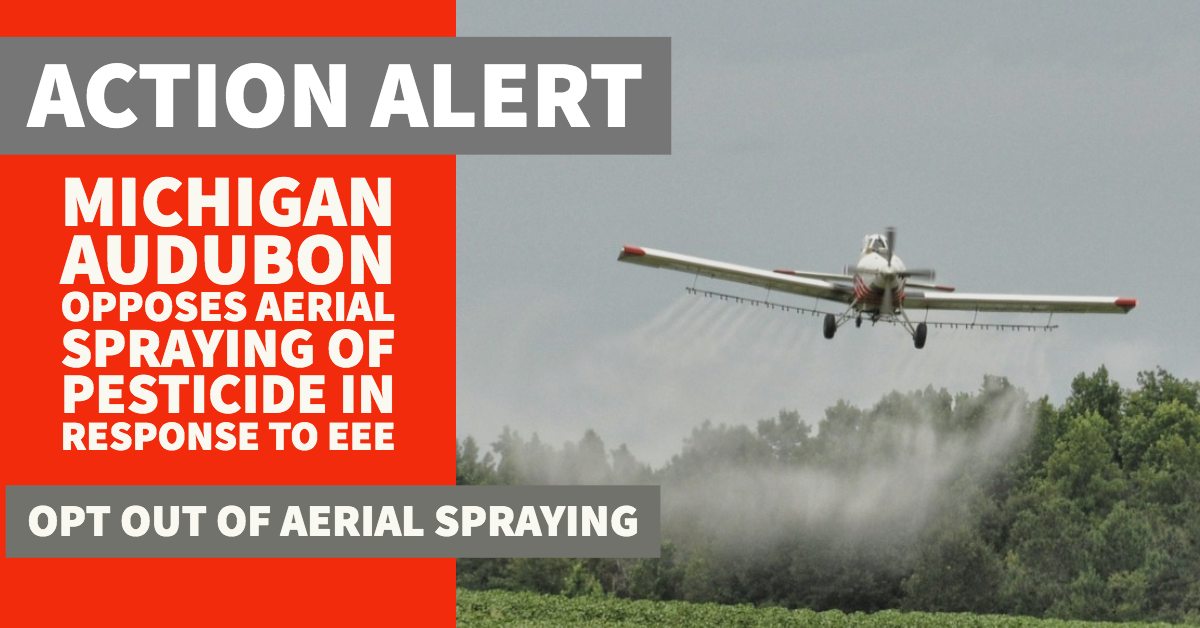Michigan Audubon is opposed to the aerial application of pesticides in response to EEE in the state of Michigan because of the damaging effects this pesticide has on the ecosystem, including native bees and pollinators, migratory and resident birds, wildlife, and humans.
“This was a hasty decision made by the state in response to a small number of cases,” said Michigan Audubon Executive Director Heather Good. “We know enough about the risks and damage of pesticides to avoid drastic measures that will undoubtedly compromise environmental health.”
According to the product label, what the State is prepared to spray on several thousands of acres in the lower peninsula of Michigan is a pesticide:
“toxic to aquatic organisms, including fish and aquatic invertebrates. Runoff from treated areas or deposition of spray droplets into a body of water may be hazardous to fish and aquatic invertebrates [ . . . ] Do not apply over bodies of water (lakes, rivers, permanent streams, natural ponds, commercial fish ponds, swamps, marshes or estuaries), except when necessary to target areas where adult mosquitoes are present, and weather conditions will facilitate movement of applied material away from the water in order to minimize incidental deposition into the water body.
This product is highly toxic to bees exposed to direct treatment on blooming crops or weeds. Do not apply this product or allow it to drift to blooming crops or weeds while bees are foraging the treatment area, except when applications are made to prevent or control a threat to public and/or animal health determined by a state, tribal or local health or vector control agency on the basis of documented evidence of disease-causing agents in vector mosquitoes, or the occurrence of mosquito-borne disease in animal or human populations, or if specifically approved by the State.”
We urge you to voice your concerns and opt out of the spray zone if it applies to your residential area today:
- Utilize the MI-TOXICS and Health Hotline. Call 1-800-MI-TOXIC (1-800-648-6942) during business hours, 8 a.m.-5 p.m., Monday through Friday and share your concern for environmental and human health today. Feedback is being recorded from the general public, which could have an impact on the state’s decision to continue spraying in the lower peninsula.
- Email [email protected] to register your concern about this program even if you don’t live in a spray zone. They are tracking opposition to this, and they are being bombarded. Let’s keep letting them know this aerial spraying is not acceptable! If you DO live in a spray zone, ask that your residence be omitted from the zone.
We anticipate “mosquito season” in Michigan will end with a frost in the next few weeks and the decision to move forward with this pesticide spraying will result in introducing a highly toxic chemical to the ecosystem, resulting in runoff. This aerial spraying will kill honey bees as well as butterflies and other beneficial, crucial insects in our ecosystem, including monarch butterflies, which are currently migrating. “The pesticide product can be toxic to honeybees or butterflies,” said Laura McGowan, spokesperson for Clarke, an Illinois-based contractor applying the pesticides.
Please take precautions with pets and children, and use your best judgments — the state is spraying a poison broadly into the air. There will be drift, runoff, and residue. Please try to safeguard your pets, honeybees, and yourselves.
Aerial mosquito spraying planned for Sunday, Sept. 29, was canceled in most counties due to inclement weather, according to a Michigan Department of Health and Human Services news release. Spraying is scheduled to take place once the weather lifts.
Please do your research and actively watch for updates about the spraying areas and schedule changes. Spraying plans may change again due to weather and/or be delayed, so the window to speak out against this spraying is still relevant and important for Michigan residents!
More information:
- State officials urge residents to visit www.Michigan.gov/EEE for the most up-to-date information.
- Learn more about the safety concerns of this pesticide here.
- See a map of the treatment zones here.
Click here for the Michigan Audubon press release regarding this issue.

